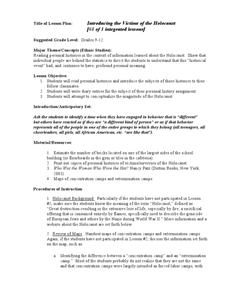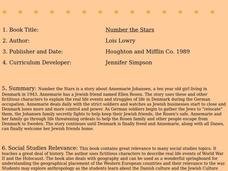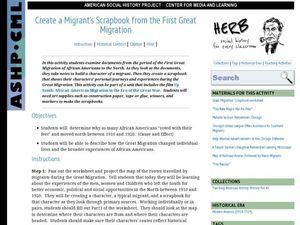Curated OER
The American War for Independence
Students complete a unit of lessons that examine the goals of the Americans during the Revolutionary War. They explore an online interactive map of major campaigns, read and analyze primary source documents, and analyze diplomatic and...
Curated OER
My Secret War: Lesson 3
Fifth graders read My Secret War. In this social studies lesson, 5th graders discuss how United States citizens worked together to ensure success in the war. Students discuss primary and secondary sources. Students paraphrase.
National WWII Museum
“My Dear Little Boys…” Interpreting a letter home from the war
Letters have long been prized by historians as primary sources for what they reveal not only about events but also about the emotional responses of the writers to these events. "My Dear Little Boys," a letter written by Leonard Isacks on...
University of California
Containing Communism Abroad
Learn more about the policy of the United States to contain communism during the Cold War. The fifth installment of an eight-part series looks at primary and secondary materials about a challenging time in history. After analyzing the...
Curated OER
WWII Website
Tenth graders research a topic related to World War II. They explore the causes and legacy of WWII, the European Theater of Operations, the Pacific Theater of Operations, Diversity in WWII, Women in WWII, and the Homefront. Students...
Curated OER
Revisiting the Somme
Learners consider how the military folly of the Somme during World War I. In this World War I lesson, students visit selected websites to discover information about the Somme, propaganda, and their effects on the war.
Curated OER
Iwo Jima: Forgotten Valor
Students explore the nature of island combat on Iwo Jima during World War II. They examine the association between the Pacific Theater of World War II and Iwo Jima. Students evaluate Charles Lindberg's oral history, propaganda posters,...
Curated OER
The Ultimate Sacrifice
Learners explore the concept of sacrifice during wartime. In this World War II lesson, students explore the Allied and Axis Powers that existed during the war. Learners discover sacrifices that were made by both powers during the war as...
Curated OER
Holocaust Unit
Students read a book about World War II and the Holocaust while in small literature circles. They write journal entries and news articles based on the reading.
Curated OER
Introducing the Victims of the Holocaust
Students consider the plight of Holocaust victims. For this World War II lesson, students discuss the number of Jews who were persecuted during the war and read biographies by Holocaust survivors. Students compose essays on personal...
Curated OER
Prisoners in Another War
Learners examine the role of the Geneva Convention. In this world history instructional activity, students investigate primary sources that prompt them to consider the evolution of the Geneva Convention.
Stanford University
Korean War
Learners study the cause of the Korean War. In this World history lesson, Students read excerpts from two different textbooks, one from South Korea, and one from North Korea. They discuss how the cause of the war differs depending on the...
Curated OER
D-Day: June 6, 1944
Students examine the preparations for the invasion of France on June 6, 1944. After viewing a clip from "The War", they identify the demands and concerns of all military leaders for this invasion. They use maps to examine the...
Curated OER
Europe Before and after WWI
Eighth graders compare and contrast maps of Europe before and after World War I. In this World War I lesson, 8th graders color and label maps of Europe prior to the war and after it. The historical maps can be accessed online.
Curated OER
Number The Stars
Students read a book about prejudices that occur in our daily lives. They describe characters in the book. Students discuss real life events of World War II and the Holocaust. Students simulate hiding Jews from the German soldiers. ...
Curated OER
Brave New World
Students view a video about the effects of World War II on the map of Europe. They discuss the video and answer questions. They work together to identify accomplishments that best represent American culture.
Curated OER
Pearl Harbor
Young scholars identify the location of Pearl Harbor and Hawaiian Islands on a map. In this map skills lesson, students use latitude and longitude coordinates to locate various places of importance of the Pearl Harbor attack.
Curated OER
"my Dear Little Boys..." Using Wwii Primary Documents: a Letter Home From the War
Students read letters written by soldiers during World War II in order to analyze the soldier's feelings about the war. They explain how these primary sources teach appreciation for the World War II soldier's experiences.
Curated OER
Treaty of Versailles
Students describe the purposes of the Treaty of Versailles. In groups, they analyze the causes and effects of the treaty and discuss why the Americans were so against it. They note ideas for and against its ratification and they make...
Curated OER
Create a Migrant's Scrapbook from the First Great Migration
Help young historians personally engage in the stories of African Americans during the Great Migration! Assessing a migration route map, learners create a migrant character's experience, adding details while studying primary sources. A...
Curated OER
Camp Stark, New Hampshire, World War II Prisoner-of-War Camp
Students examine the political, personal, and geographical boundaries created by World War II to the citizens and prisoners of war at Camp Stark.
National Endowment for the Humanities
The War in the North, 1775–1778
Using primary source documents, including maps, learners examine Revolutionary War events from 1775 to 1778. The focus here is on the challenges George Washington and the Continental army faced and how they persevered in spite of those...
Curated OER
Journey to Gettysburg
Students use latitude and longitude to map the path of the Battle of Gettysburg.
Curated OER
Turning the Tide in the Pacific, 1941-1943
Students analyze the Japanese strategy for the Pacific and compare it to the Allied strategy. They identify on a map the sites that were important the early war in the Pacific, and identify key military engagements.

























